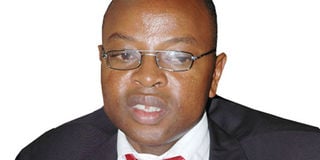Kiggundu vs DTB case needs more of wisdom than law

What you need to know:
As a Christian, I can’t believe that, for example, the only music God smiles on is highbrow or hymns.
On October 7, the country was hit with a bombshell in form of a judgment of a case in which Hamis Kiggundu had sued Diamonf Trust Bank (DTB) Uganda Ltd and DTB Kenya Ltd for appropriating money from his account illegally. What is the issue?
Between 2011 and 2016, Kiggundu borrowed money to the tune of Shs41 billion from DTB-Kenya and DTB-Uganda to finance his real estate business.
He duly signed the loan agreement with DTB-Kenya. This loan was reportedly syndicated. Loan syndication often happens when a single lender is not able to raise sufficient amount required by a borrower. It is advantageous because a syndicated loan spreads risk exposure from one entity. In Uganda’s case, it is extremely useful because of low financial asset base by our economic agents (commercial banks, insurance companies, and pension funds, among others).
Around December 2019, Kiggundu raised concerns with DTB- Uganda that the bank was debiting his account without his consent.
He later sued the bank and won the case with the following pronouncements:
l DTB- Kenya Ltd illegally carried out business in Uganda without having a license from Bank of Uganda as required by law, and that DTB-Uganda should refund all the money it had debited from Kiggundu’s accounts and that DTB should unconditionally return all Kiggundu’s mortgaged properties after cancelling the loan mortgages.
l That DTB-Uganda should pay damages with 8 per cent interest as well as costs of the suit. Observations:
l Uganda’s economy is very small with a GDP of a paltry $30b and the entire commercial bank asset portfolio in Uganda is a mere Shs33.4 trillion.
l The small nature of the economy means that our financial institutions have to be leveraged through syndicating with other relatively financially powerful institutions in order to be able to disburse loans for financing large projects. For example, Kampala Oil Terminal Reserves, Kaabale Airport in Hoima, and East African Oil Pipeline are all projects funded under syndicated loan arrangement. The essence is to share risk. Same as insurance companies as most of them have to re-insure if they take on high risk policies.
l It should also be noted that Uganda relies heavily on Foreign Direct Investment. It is, therefore, not wise to abuse the only window of syndicated loans available to us. It is instructive that in making judgments o such a matter as Hamis Kiggundu Vs DTB, our learned friends need not appear as if they are “bewitched” by legalism. I do not mean that we pursue the opposite, which is “everybody doing as you please”. As a Christian, I can’t believe that, for example, the only music God smiles on is highbrow or hymns.
Only to state that we cannot be wrought up, yet limitations of any given regulations are usually broader than most of us realise. There is need to consider wider ramifications given our contextual realities.
Judgments of this nature can send signals that can irretrievably hurt the economy. As we all know “there are many laws that are “unjust”. A judgment of this nature should have realised that the implications are beyond law. However, the Peter Adonyo judgement is also a wake up call. There is no amount of action that can justify an illegality. As the Bible says, sin is sin” (James 4:17). There is no acceptable sin. And as Martin Luther counsels, “the recognition of sin is the beginning of salvation.”
More important is that this judgment is also a wake up call for our Central Bank to be more diligent in carrying out its duty of regulating the financial sector, particularly foreign lending. The greatest lesson learnt is that certain court decisions may be well and legally premised, but epistemologically in need of resolutions based on wisdom. The writing is clear on the wall.
Prof Augustus Nuwagaba is an economic transformation consultant.




